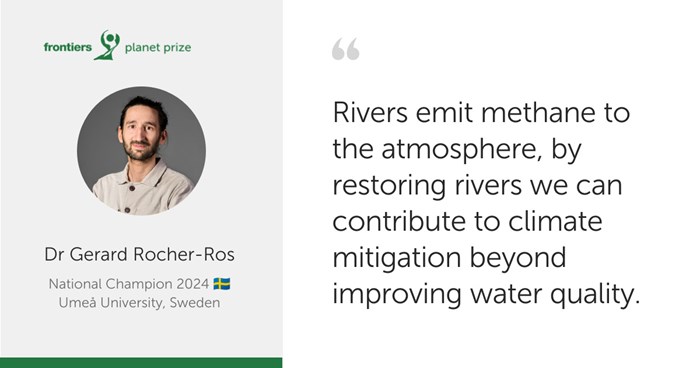SLU-researcher Swedish finalist for climate research prize

Researcher Gerard Rocher-Ros in Umeå receives the Swedish nomination for the prestigious Frontiers Planet Prize as one of 23 top sustainability researchers from around the world.
This is the second consecutive year that the Frontiers Research Foundation nominates national finalists for the Frontiers Planet Prize. The announcement is on April 22, on "Earth Day," for a reason. The newly instituted prize is intended to stimulate high-level research that can contribute to concrete solutions for the challenges threatening the Earth's ecosystems. Out of the 23 finalists from various countries, three final winners will receive one million Swiss francs each (approximately 12 million SEK) for their ongoing research.
– I am really happy that Gerard is being recognized for this prestigious award. He is a uniquely talented scientist, with an ability to combine his deep understanding of freshwater ecosystems with exceptional computational skills. For this paper, he was able to combine and analyze multiple global datasets to address an important question at a spatial scale that I would not have thought possible 20 years ago, says Ryan Sponseller, Associate Professor at the department of Ecology and Environmental Science at Umeå University and postdoc supervisor for Gerard.
In collaboration with researchers in US, the researchers at Swedish University of Agricultural Sciences and Umeå University have compiled data on how running water on earth contribute to methane emissions, in a study published in Nature in 2023. Freshwater systems account for half of the global emissions of the potent greenhouse gas methane, but it has long been unknown how significant the role of rivers and streams is in this cycle. With the help of thousands of observations, the researchers could show that rivers and streams emit methane at a similar rate to lakes globally. Particularly clear results were seen in the northern regions.
– We expected to find the highest emissions at the tropics, where it is warm, because the biological production of methane is highly sensitive to temperature. Instead, we found that emissions are also elevated in boreal and tundra biomes, despite low temperatures, likely because northern streams and rivers are often connected to peatlands and wetlands that are powerful methane sources, explained Gerard Rocher-Ros when the study was published.
Where human activity is particularly significant, such as in canals, ditched streams, and rivers downstream of wastewater treatment plants, emissions tend to be higher. This insight motivates the many ongoing efforts in river restoration for the sake of biodiversity to continue, since these measures may also have positive effects on emissions.
– In addition to improving freshwater quality and protecting the sensitive biosphere, restoration can also reduce the climate impact by lowering methane emissions, says Gerard Rocher-Ros.
The three final winners will be crowned at the Villars Symposium in Switzerland on June 26.
Link to the study: https://www.nature.com/articles/s41586-023-06344-6
Frontiers Planet Prize website: https://www.frontiersplanetprize.org/editions-second-edition
Read our news article on the Nature study (2023): https://www.slu.se/en/ew-news/2023/8/high-methane-emissions-from-northern-rivers-and-streams/
